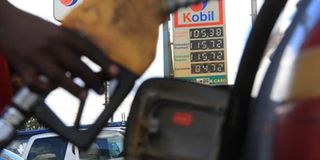Relief as cost of petrol and kerosene falls

An attendant at a Nyeri petrol station on May 13, 2014. FILE PHOTO | JOSEPH KANYI |
What you need to know:
- Fuel prices have a significant impact on inflation in the economy which depends heavily on diesel for transport, power generation and agriculture.
- The drop will help cut the cost of power as the fuel levy, charged on electricity bills, is expected to fall further.
Motorists are set to pay less for fuel following a drop in prices of crude oil in the international market, the Energy Regulation Commission has announced.
Director-general Joseph Ng’ang’a said in a statement that Super petrol will now retail at Sh4.98 less while kerosene prices have gone down by Sh1.42 and diesel Sh0.62 per litre.
The new guidelines that take effect on Monday will see motorists in Mombasa pay Sh108.28 per litre of super while those in Nairobi will spend Sh111.64 for the next 30 days.
Similarly diesel will retail at Sh99.03 a litre in Mombasa and Sh102.36 in Nairobi.
Mr Ng’ang’a said the review was a result of the fall in average landed cost of the various imported petroleum products. “Imported super petrol decreased by 6.97 per cent from $1,076.74 per tonne in July from $1001.64 in August.
CAUTIONED DEALERS
“Over the same period the average landed cost of kerosene decreased by 3.45 per cent from $990.75 per tonne in July, 2014 to $956.53 per tonne in August, 2014, while diesel reduced by 0.77 per cent from $925.40 in July to $918.30 per tonne in August,” the director-general said.
Mr Ng’ang’a cautioned petroleum dealers and marketers against going against the price guidelines set by the commission as that would be a violation of the law.
“It is an offence to sell petroleum products above the maximum prices published by the commission, and those who contravene it could have their licences revoked or liable to a fine of up to Sh1 million,” he said.
Fuel prices have a significant impact on inflation in an economy which depends heavily on diesel for transport, power generation and agriculture, while kerosene is used in many households for lighting and cooking.
Inflation increased to 8.36 per cent in August from 7.67 per cent in July on the back of rising food, electricity and transport prices. It was the highest level since June 2012.
Kenyan authorities prefer inflation at between 3.5 and 7.5 per cent.
The drop will help cut the cost of power as the fuel levy, charged on electricity bills, is expected to fall further.
Additional reporting by Galgallo Fayo.





